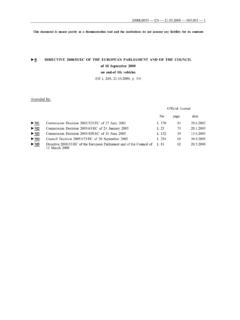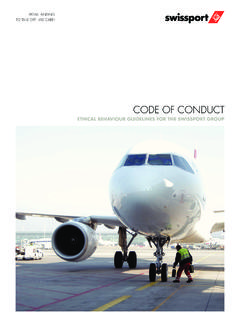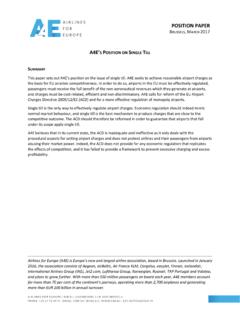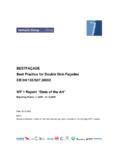Transcription of Competition and Payment Systems 2012 - OECD.org
1 Competition and Payment Systems 2012 . The OECD Competition Committee discussed payments Systems in October 2012 . This document includes an executive summary of that debate, a detailed summary of discussion and the documents from the meeting: a note by Mr. Wilko Bolt and written submissions from Canada, Denmark, Estonia, European Union, France, Germany, Hungary, Iceland, Indonesia, Israel, Latvia, Lithuania, New Zealand, Norway, Poland, Romania, Russian Federation, Switzerland, Chinese Taipei, Turkey, United Kingdom, United States and BIAC. The ongoing shift from cash and paper towards electronic Payment Systems potentially brings large economic benefits. But card payments in particular have remained expensive for merchants, and regulation may have unintended consequences.
2 There is no consensus among economists and policymakers on what constitutes an efficient fee structure for card-based payments , and it is not clear if Payment Competition might do the trick. Regulation should be geared towards removing barriers of entry in Payment markets and banning merchant (pricing) restrictions. The discussion reviewed recent countries' experiences on developments regarding all non-paper based forms of Payment such as debit and credit cards, and E- payments (through internet, mobile phones etc.). Many members are investigating these markets, and EU jurisdictions are implementing the EU. payments service directive, which aims to provide a single market for payments . Market Definition ( 2012 ).
3 Competition , Concentration and Stability in the Banking Sector (2010). Competition and Financial Markets (2009). Competition and Efficient Usage of Payment Cards (2006). Competition in Retail Banking (2006). Enhancing the Role of Competition in the Regulation of Banks (1998). Unclassified DAF/COMP( 2012 )24. Organisation de Coop ration et de D veloppement conomiques Organisation for Economic Co-operation and Development 28-Jun-2013. _____. _____ English - Or. English DIRECTORATE FOR FINANCIAL AND ENTERPRISE AFFAIRS. Competition COMMITTEE. Unclassified DAF/COMP( 2012 )24. Competition AND Payment Systems . English - Or. English JT03342499. Complete document available on OLIS in its original format This document and any map included herein are without prejudice to the status of or sovereignty over any territory, to the delimitation of international frontiers and boundaries and to the name of any territory, city or area.
4 DAF/COMP( 2012 )24. FOREWORD. This document comprises proceedings in the original languages of a Roundtable on Competition and Payment Systems held by the Competition Committee in October 2012 . It is published under the responsibility of the Secretary General of the OECD to bring information on this topic to the attention of a wider audience. This compilation is one of a series of publications entitled " Competition Policy Roundtables". PR FACE. Ce document rassemble la documentation dans la langue d'origine dans laquelle elle a t . soumise, relative une table ronde sur la concurrence et les syst mes de paiement qui s'est tenue en octobre 2012 dans le cadre du Comit de la concurrence. Il est publi sous la responsabilit du Secr taire g n ral de l'OCDE, afin de porter la connaissance d'un large public les l ments d'information qui ont t r unis cette occasion.
5 Cette compilation fait partie de la s rie intitul e "Les tables rondes sur la politique de la concurrence". Visit our Internet Site -- Consultez notre site Internet 2. DAF/COMP( 2012 )24. TABLE OF CONTENTS. EXECUTIVE SUMMARY ..5. CONTRIBUTIONS FROM DELEGATIONS. Canada ..9. Denmark ..15. Estonia ..21. European Union ..23. France (Version Fran aise) ..33. France (English Version) ..41. Germany ..49. Hungary ..55. Iceland ..61. Indonesia ..67. Israel ..71. Lithuania ..77. New Zealand ..83. Norway ..91. Romania ..103. Russian Federation ..109. Chinese Taipei ..125. Turkey ..129. United Kingdom ..133. United States ..139. BIAC ..149. CONTRIBUTION FROM EXPERTS. Mr. Wilko Bolt -- Retail Payment Systems : Competition , Innovation and Implications.
6 161. OTHER REFERENCES ..171. SUMMARY OF DISCUSSION ..177. **. SYNTH COMPTE RENDU DE LA DISCUSSION ..207. 3. DAF/COMP( 2012 )24. 4. DAF/COMP( 2012 )24. EXECUTIVE SUMMARY. By the Secretariat In light of the written submissions and the oral discussion, the following points emerge: (1) An aim of Competition enforcement is to identify, stop and deter anti-competitive arrangements and behaviour by market participants, particularly when it has a direct impact on consumer welfare. In the Payment Systems sector, where many markets operate with multi-sided platforms, anti-competitive arrangements and behaviour may have an impact on participants in different markets, be they consumers, merchants or banks. An initial consideration for Competition authorities is generally to properly define the relevant markets that an arrangement or behaviour affects.
7 Many relevant markets in the payments Systems sector involve multi-sided platforms. It is appropriate to consider this industry characteristic, just as any other relevant industry characteristics are appropriate to consider in the process of obtaining a thorough understanding of how a particular market functions; Competition analysis is always a fact-driven process. In markets with multi-sided platforms, a number of markets may be affected by a restriction on Competition , but the Competition analysis will normally focus just on the relevant market where the restriction of Competition is found. For example, in the EU's decision concerning MasterCard MIFs, the relevant market where the effect on Competition was analysed was the acquiring market, although the issuing market and wider inter- system market were also defined.
8 In the EU's decision concerning Visa / Morgan Stanley, the relevant market was also defined as the acquiring market, whereas in the EU's case against Groupement des Cartes Bancaires, the relevant market was defined as the issuing market. (2) Restrictions of Competition in Payment markets may have a variety of impacts on different consumer groups given the multi-sided platforms that operate in many of these markets. When assessing the impact of potentially anti-competitive behaviour like, say, the setting or changing of interchange fees ("IF"), one should take into consideration that this might affect different groups of consumers in different ways. First, when faced with a reduction in the IF, the merchants may keep some of that reduction and pass-on some to the cardholder and other customers in the form of lower prices.
9 Secondly, the bank may see an increase in card payments compared to cash payments (if merchants promote card payments at a lower fee) but they may also perhaps try to increase prices to cardholders and other bank clients to make up for decreased IF revenue. But in this case, the account holders are likely to consider switching banks and any collective action by banks may face antitrust enforcement. This illustrates that assessing the impact on different groups of consumers may be complicated, when the effects on different markets are taken into account. It is important to recognize that one group of consumers ( , merchants) may be disadvantaged, even if there may be potential benefits to other consumer groups.
10 Moreover, the critical point to recall is that Competition policy is aimed to protect the process of Competition , not to assure any particular outcome. One person argued that the overall impact on cardholders cannot be determined unless we know the rates of merchant pass-through and bank pass-through. However, the existing research on this 5. DAF/COMP( 2012 )24. topic is far from consensual and it is possible that different market conditions will yield different rates of pass-through in different countries or regions of the world. It is also possible that the merchants' or the banks' pass-through is not purely price-based, that it can impact the quality and level of service and not necessarily only the price.

















